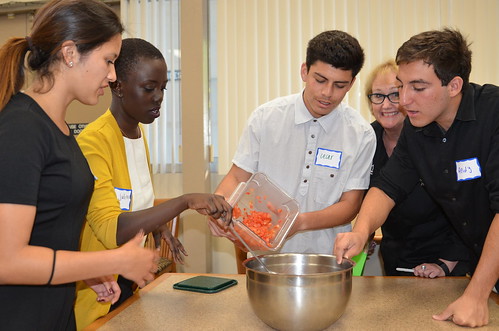
This post is part of the Science Tuesday feature series on the USDA blog. Check back each week as we showcase stories and news from USDA’s rich science and research portfolio.
Educators at Mesa College, in San Diego, Calif., are developing future leaders in agricultural sciences and related fields by providing them with a solid background in science, technology, engineering, and mathematics (STEM) education.
The STEM Engagement for the Enrichment of Diverse Students (SEEDS) program is a four-year effort to encourage underrepresented students, primarily Hispanic, to pursue graduate degrees. The U.S. Department of Agriculture’s National Institute of Food and Agriculture is supporting the project with a $290,000 grant.
“I envisioned the SEEDS program as a golden opportunity to address issues regarding food security, hunger, and sustainability that disproportionally affect the Latino population,” said Leticia Lopez, SEEDS project director. “I am committed to mentoring underrepresented students in these areas.”
With a Latino enrollment rate of 33 percent, Mesa College is designated a Hispanic-serving institution (HSI). “It is very important for more HSIs, particularly community colleges, to receive federal grant funding to launch programs, such as SEEDS,” Lopez said. “SEEDS uses grant funds to help a higher proportion of its low-income and Latino students experience academic success and transfer to a 4-year university with the tools necessary to be successful.”
The first 20 SEEDS scholars entered the program in June and are majoring in such STEM fields as anthropology, nutrition, biology, and geology. An additional 20 students will join the program in each of the next two years. Along with traditional studies, SEEDS scholars will participate in several community projects. Four SEEDS scholars attended the Hispanic Association of Colleges and Universities annual conference, Oct. 10-12, and all 20 are involved in planning Mesa College’s Sustainability Week events, Oct. 20-23.
“The scholars will ‘pay it forward’ by serving as ag science mentors to children in elementary and middle schools, volunteer in building community gardens, and increase community awareness of environmental issues that adversely affect our health at a local and global level,” Lopez said. “They will also serve as role models to other Latino/Latina students who struggle to find STEM-related subjects interesting, viable, or relevant.”
In addition to gaining a STEM foundation for future academic growth, SEEDS scholars receive a $500 stipend and the top graduate will receive a $40,000 scholarship toward an advanced degree in a sustainability, agriculture, or other STEM-related field.
NIFA invests in and advances agricultural research, education and extension and seeks to make transformative discoveries that solve societal challenges.
